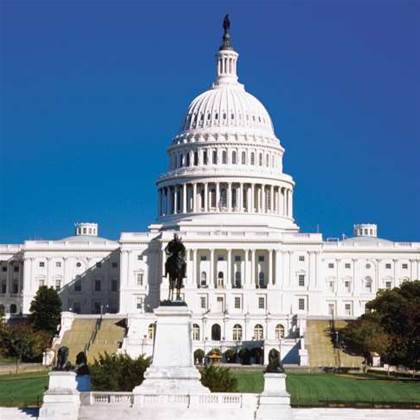US politicians have responded to moves from within the United Nations to form an inter-Government panel to regulate the internet, putting forward a resolution demanding the UN maintain a "hands-off approach".

Responding to an exclusive iTnews report on the United Nations discussion (which overnight became the most read story in iTnews' history), California Congresswoman Mary Bono Mack has put forward a resolution that the United Nations and other international governmental organisations take their hands off the Internet.
Introducing House Resolution 1775 [see full text below], Mack argued that "the Internet has progressed and thrived precisely because it has not been subjected to the suffocating effect of a governmental organization's heavy hand.
"The attempt of the United Nations to overtake something that is so central to our economy-like the Internet-is offensive and completely out of line," she said.
"We have a hard enough time keeping the Federal Communications Commission's hands off the Internet; imagine having to convince governments like Syria, Iran and Venezuela."
Mack insisted that market-based policies and private sector leadership allowed the Internet the flexibility to evolve and continue to push the boundaries of innovation.
"I call on the President and his Administration to oppose any effort to transfer control of the Internet to the United Nations or any other international governmental entity."
Mack - who is the incoming Chairwoman of the Subcommittee on Commerce, Manufacturing and Trade within the United States House Energy and Commerce Committee - wasn't a lone voice in opposing efforts to police the internet in the wake of WikiLeak's 'Cablegate' fiasco.
A US Congressional hearing calling for criminal charges against WikiLeaks' founder Julian Assange was also played down as "extreme".
"There is far too much secrecy and overclassification in the executive branch, and I think it puts American democracy at risk." said Congressional Democrat representative William Delahunt (Massachusetts).
Cerf, Google rally troops
Vint Cerf, widely regarded as the father of the internet, also hit out at the United Nations plan.
"Today, I have signed that petition on Google's behalf because we don't believe governments should be allowed to grant themselves a monopoly on Internet governance," Cerf said on Friday on behalf of Google where he works as its chief internet lobbyist.
Cerf said the beauty of the existing governance structure was that it was "bottoms-up" and influenced by a range of stakeholders, including companies and academics.
"This model has not only made the Internet very open—a testbed for innovation by anyone, anywhere—it's also prevented vested interests from taking control," said Cerf.
Cert called on concerned stakeholders to sign a petition penned by, amongst others, Australia's top level domain regulator, auDA, The Internet Governance Caucus, the Internet Society and the ICANN, the International Chamber of Commerce, Internet Corporation for Assigned Names and Numbers.
The text of Mack's House Resolution 1775 reads as follows:
_______________________________________
RESOLUTION
Expressing the sense of the House that the United Nations and other international governmental organizations shall not be allowed to exercise control over the Internet.
Whereas market-based policies and private sector leadership have allowed the Internet the flexibility to evolve; Whereas given the importance of the Internet to the global economy, it is essential that the underlying technical infrastructure of the Internet remain stable and secure; Whereas the developing world deserves the access to knowledge, services, commerce, and communication, the accompanying benefits to economic development, education, health care, and the informed discussion that is the bedrock of democratic self-government that the Internet provides; Whereas the explosive and hugely beneficial growth of the Internet did not result from increased government involvement but from the opening of the Internet to commerce and private sector innovation; Whereas some nations that advocate radical change in the structure of Internet governance censor the information available to their citizens through the Internet and use the Internet as a tool of surveillance to curtail legitimate political discussion and dissent, and other nations operate telecommunications systems as state-controlled monopolies or highly-regulated and highly-taxed entities; Whereas some nations in support of transferring Internet governance to an entity affiliated with the United Nations, or another international entity, might seek to have such an entity endorse national policies that block access to information, stifle political dissent, and maintain outmoded communications structures; Whereas the structure and control of Internet governance has profound implications for homeland security, competition and trade, democratization, free expression, access to information, privacy, and the protection of intellectual property, and the threat of some nations to take unilateral actions that would fracture the root zone file would result in a less functional Internet with diminished benefits for all people: Now, therefore, be it
Resolved, That the House--
(1) calls on the President to continue to oppose any effort to transfer control of the Internet to the United Nations or any other international governmental entity; and
(2) calls on the President to--
(A) recognize the need for, and pursue a continuing and constructive dialogue with the international community on, the future of Internet governance; and
(B) advance the values of a free Internet in the broader trade and diplomatic conversations of the United States.
(Additional reporting by Liam Tung)


.png&h=140&w=231&c=1&s=0)
_(28).jpg&h=140&w=231&c=1&s=0)

_(33).jpg&h=140&w=231&c=1&s=0)





 iTnews Benchmark Awards 2026
iTnews Benchmark Awards 2026
 iTnews Executive Retreat - Security Leaders Edition
iTnews Executive Retreat - Security Leaders Edition
 iTnews Cloud Covered Breakfast Summit
iTnews Cloud Covered Breakfast Summit
 The 2026 iAwards
The 2026 iAwards










_(1).jpg&h=140&w=231&c=1&s=0)



